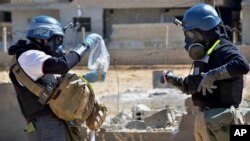The United States is urging the government of Syria to live up to its commitment to hand over its stockpile of chemical weapons in order that they may be destroyed.
On January 30, Robert Mikulak, the U.S. representative to the Organization for the Prohibition of Chemical Weapons, said at the organization’s Executive Council Meeting in The Hague, that the “effort to remove chemical agent and key precursor chemicals from Syria has seriously languished and stalled. To date, only four percent of the Priority One chemicals declared by the Syrian Arab republic have been removed, and roughly the same small percentage of the Priority Two Chemicals.”
Ambassador Mikulak acknowledged that the timeline of December 31, 2013 for the 100 percent removal of Priority One chemicals “was an ambitious goal.” However, he noted that Syria had not even begun the transport of those chemicals to the port of Latakia by December 31st, and now more than a month has passed.
At a press briefing, White House spokesman Jay Carney said the Syrian regime, as UN Secretary General Ban Ki-moon has officially noted, “has the capability to move the chemicals” and “should immediately take the necessary actions to comply with its obligations…and ensure that the removal effort is conducted with regularity rather than after long intervals.”
Speaking to reporters in Berlin, Secretary of State John Kerry said Bashar al–Assad “needs to understand that he agreed to an international United Nations Security Council resolution which has reinforced a requirement that he remove all of those weapons and that he do so in a specific period of time.
“Every indication we have is there is no legitimate reason that that is not happening now,” said Mr. Kerry. “And therefore we call on Bashar al-Assad to live up to his obligations or we will join together with our friends and talk about which, if any, of the options we deem necessary at this point to proceed forward.”
On January 30, Robert Mikulak, the U.S. representative to the Organization for the Prohibition of Chemical Weapons, said at the organization’s Executive Council Meeting in The Hague, that the “effort to remove chemical agent and key precursor chemicals from Syria has seriously languished and stalled. To date, only four percent of the Priority One chemicals declared by the Syrian Arab republic have been removed, and roughly the same small percentage of the Priority Two Chemicals.”
Ambassador Mikulak acknowledged that the timeline of December 31, 2013 for the 100 percent removal of Priority One chemicals “was an ambitious goal.” However, he noted that Syria had not even begun the transport of those chemicals to the port of Latakia by December 31st, and now more than a month has passed.
At a press briefing, White House spokesman Jay Carney said the Syrian regime, as UN Secretary General Ban Ki-moon has officially noted, “has the capability to move the chemicals” and “should immediately take the necessary actions to comply with its obligations…and ensure that the removal effort is conducted with regularity rather than after long intervals.”
Speaking to reporters in Berlin, Secretary of State John Kerry said Bashar al–Assad “needs to understand that he agreed to an international United Nations Security Council resolution which has reinforced a requirement that he remove all of those weapons and that he do so in a specific period of time.
“Every indication we have is there is no legitimate reason that that is not happening now,” said Mr. Kerry. “And therefore we call on Bashar al-Assad to live up to his obligations or we will join together with our friends and talk about which, if any, of the options we deem necessary at this point to proceed forward.”






